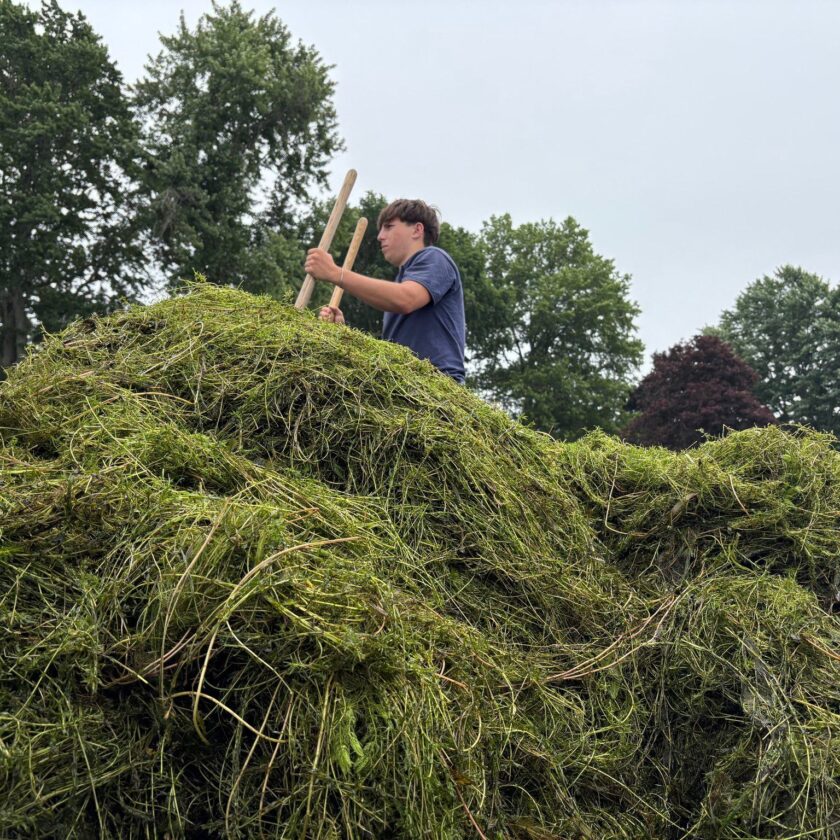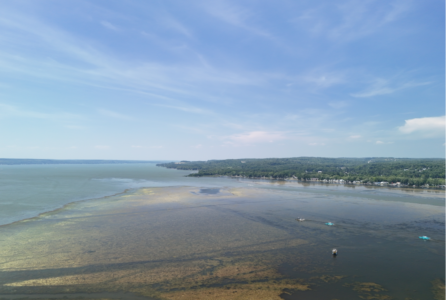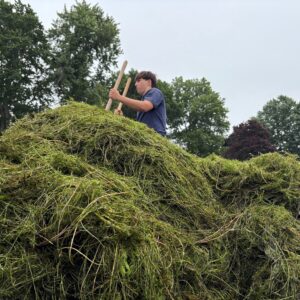State DEC Testimony Details 2025 Lake Permits

A Chautauqua Lake Association crew member is pictured removing weeds from one of the CLA’s barges recently. Photo courtesy Chautauqua Lake Association Facebook page
State DEC officials say changes to the state’s Freshwater Wetlands Act isn’t a major change to the way state environmental regulations are handled on Chautauqua Lake.
The DEC responses to four lawsuits filed in state Supreme Court earlier this year argue that new regulations formed after the state Legislature’s 2022 passage of Freshwater Wetlands Act updates met state Constitutional guidelines and followed state law. Plaintiffs in the lawsuits – which include separate lawsuits filed by the Chautauqua Lake Property Owners Association and Chautauqua Lake Partnership – argue the opposite.
The lawsuit by the Chautauqua Lake Partnership and board members Mary Hutchings, Michael LaTone and James Cirbus was filed after the organization finished DEC permit applications for the first round of herbicides that were applied this week in Chautauqua Lake and with another round of herbicide permitting being processed.
Among those testifying via affidavit are Lisa M. Czechowicz, regional permit administrator at the DEC’s Region 9 office in Buffalo, who detailed the process so far this year regarding permits on Chautauqua Lake.
“Aquatic vegetation harvesting and herbicide application were regulated activities under the previous wetland regulations. Therefore, an ECL article 24 freshwater wetlands permit has always been required for these activities in wetland areas. The amended regulations have only expanded the regulated area and modified wetland classification criteria, not the scope of regulated activities. The amended regulations are more protective of the lake because they allow DEC to limit harvesting in known fish habitat zones to one single lane no wider than 25 feet to improve navigability and also maintain viable fish populations in the lake. Under the amended 6 NYCRR part 664 regulations, additional portions of Chautauqua Lake are now regulated as freshwater wetland due to the presence of submerged aquatic vegetation, which provides habitat for fish and other aquatic animals.
Accordingly, certain regulated activities, including herbicide applications and aquatic vegetation harvesting, now require ECL article 24 wetland permit applications in more areas of the lake than in previous years,” Czechowicz said.
Ellery and Ellicott officials submitted Article 15 permits on Feb. 17, followed by the town of Busti on Feb. 20, both to control curly leaf pondweed within their borders. The towns were told March 14 that an Article 24 permit would be required after a positive jurisdictional determination had been made by the DEC due to the presence of submerged aquatic vegetation beds in the lake, which DEC officials said means the areas are classified as wetlands of unusual importance. Ellery and Ellicott turned in Article 24 permits on March 21, with Busti’s submitted March 26. Permits were determined to be administratively complete March 28 and the permits were issued on April 22. Applications were scheduled to begin April 28.
“Thus, the additional approvals required by the amended wetland regulations did not adversely impact the treatment of invasive aquatic vegetation in Chautauqua Lake,” Czechowicz said. “The amended wetland regulations simply require submission of a second permit application with a similar level of detail as the ECL article 15 application. Therefore, the amended wetland regulations did not create an impediment to the management of invasive aquatic vegetation in Chautauqua Lake.”
As lake conditions became more challenging, however,it took time for additional permits to be approved. Busti and Ellicott submitted applications to modify their Article 24 permits on June 2 for additional treatment of Eurasian watermilfoil, with those applications deemed administratively complete on July 1. Public comments were to end July 24. And, the Chautauqua Lake Association submitted an Article 24 permit on April 30 for aquatic weed harvesting. That permit was granted June 5.
While the Freshwater Wetlands Act didn’t curtail herbicide applications, Chautauqua Lake Partnership officials say it is arbitrary and capricious to designate lakes as freshwater wetlands, that the Freshwater Wetlands Act’s incorporation of “wetlands of unusual importance” is arbitrary and capricious and should be void because it is too vague and alleges the DEC didn’t follow the state’s own Environmental Quality Review Act and the State Administrative Procedures Act. CLP officials also say two of the 11 deciding factors in declaring wetlands in the Freshwater Wetlands Act delegate too much authority to the state DEC without proper safeguards.
Czechowicz said the DEC is developing a Lakes and Shorelines General Permit to authorize various activities commonly undertaken by property owners such as shoreline erosion protections, repair and replacement of existing functional shoreline protection, in kind replacement or repair of boat or access ramps, installation of new single lane boat/access ramps, repair and replacement of existing functional boat houses, docks, platforms, or similar over water structures, installation of new residential docks, new navigational dredging, installation of dry fire hydrants, water intake lines, or beach wells. DEC is also developing modifications to the existing general permit for management of invasive species under consideration to authorize the management of invasive and nuisance species by various methods such as hand harvesting, suction harvesting, aquatic pesticides, benthic barriers, and mechanical harvesting and cutting.
“Although none of the petitioners experienced any delay in being able to conduct invasive species management on Chautauqua Lake, DEC is nonetheless developing tools to streamline the ECL article 24 permit application process,” Czechowicz said.



